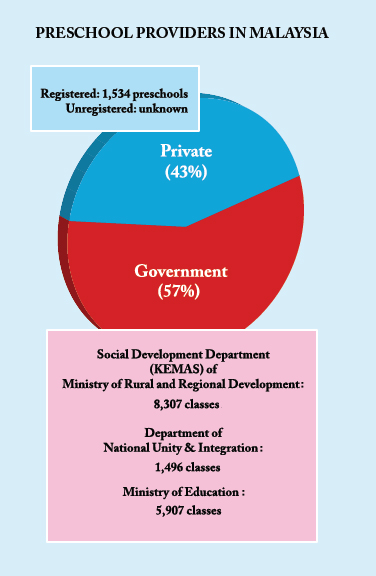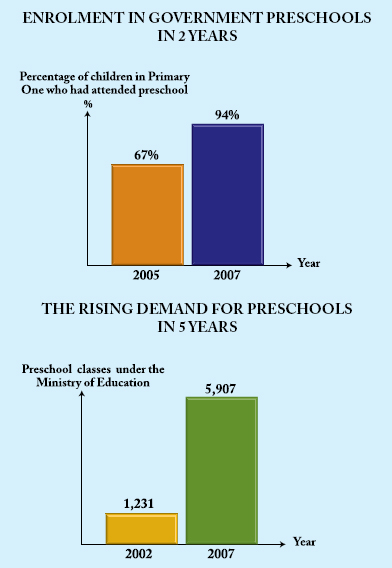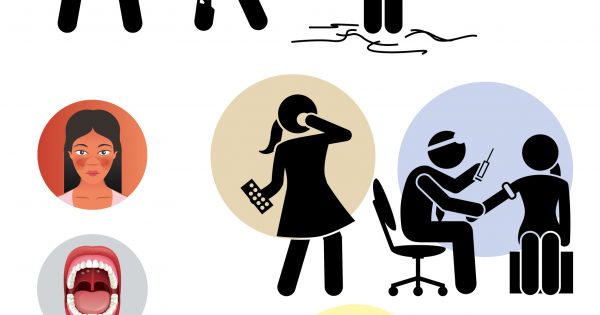“B-A-L-L spells ball, mommy!” Jamie tells you proudly. You look at the giant loopy scrawls in your son’s book. You cannot make out a single letter but you give him a big hug anyway. Jamie is into his second month in preschool and so far, he seems to be having fun. More importantly, he is learning to read and write. You can see that in the pages and pages of homework he does daily. “He is learning well. He should be able to read and write legibly soon,” you smile.
The same thoughts are going through the minds of thousands of Malaysian parents who send their children to preschool every year. Like you, they know the importance of education, and like you, they are just as anxious.
But preschool is more than just learning how to read and write. It is about providing your child with quality Early Childhood Care and Education (ECCE) that will give him a solid foundation for learning and for life … and that certainly encompasses much more than knowing your A-B-Cs and 1-2-3s.
|
A Headstart To Life |
|
ECCE is a concept based on providing children with ‘sound beginnings’. Research shows that the first six years of a child’s life are critical. It is during this time that they develop the psychological and social aptitudes that will form the foundation of their approach to life as adults. How well (or poorly) these aptitudes are formed depends heavily on their day-to-day environment and the experiences they have. Quality ECCE ensures that children get the right experiences and stimulation to optimise this development. The benefits of quality ECCE are recognised the world over. “Children who have had ECCE demonstrate better communication skills, better cognition, are able to interact with others positively and are more emotionally secure than children who have not,” says Datin Radziah. “These skills will help your child adapt well and succeed in formal schooling and beyond.” Datin Radziah M Daud |
|
A Curriculum That Fits The Child |
|
And that is the ultimate aim of the education system: to produce thinking individuals who are inquisitive, able to create and innovate, solve problems and are constantly exploring new ideas; skilled and resilient individuals who love their country and are grounded in moral values. This need for human capital makes ECCE all the more critical as a solid foundation that must be set from young. The National Preschool Curriculum (NPC) was formulated and introduced in 2003 as a set of guidelines to help preschools plan activities and construct experiences that will optimise all aspects of the children’s development. “The Education Act 1996 states that all preschools – government and private – have to abide by the NPC. Because the NPC is flexible, private preschools can easily incorporate it into their own methodologies,” says Jayawathi. Jayawathi Perera |
Association of Professional Early Childhood Educators, Malaysia (MAPECE) President, Professor Dr Chiam Heng Keng says that the National Preschool Curriculum (NPC) ensures that preschools remain child-centered and not parent- or teacher-centered. “It is a curriculum that fits the child and not the other way round. It is developmentally appropriate and promotes learning through play, which is a very important part of childhood.”
“The NPC is skills-based, not content-based,” she says. “For instance, the focus is on developing the skills of communicating, counting, thinking, reasoning, getting information and making sense of that information, making friends and so on. Homework and examinations are discouraged.”
Choices Aplenty
There are so many preschool providers in Malaysia today that parents are spoilt for choice. According to Dato’ Alimuddin, it was back in the 1950s when preschools began making their presence felt here. “At that time, preschools were established mainly by the private sector and catered to wealthy families in the urban areas. The government established its first public preschools in the 1970s with the aim of narrowing the gap between the urban and rural children. The KEMAS preschools opened in 1971, Perpaduan preschools in 1976 and Ministry of Education preschools in 1992,” he says. “The NPC is delivered through government-run preschools and private preschools that have been registered with the Ministry of Education. This is enforced and monitored by our officers in the State Education Departments. ”
“Parents today understand that a quality preschool education is the foundation of their children’s future. The demand is growing as more parents enrol their children in preschool,” he says. “The government is rising to meet this demand by increasing the number of public preschools and preschool classes.”
“Children who have received good care and education from an early age will develop well socially and emotionally. They learn positive attitudes, values and behaviours that will make them useful, participating members of society in the future.”
ECCE Is Your Responsibility Too
Early Childhood Care and Education (ECCE) is provided not just through preschools but at home too. You can build a strong foundation for your children’s future by creating for them the right environment and ensuring that they have positive experiences at all times – whether they are at home or at preschool.
UNDERSTAND IT
Start by first familiarising yourself with the concept of ECCE. You have taken the first step by reading this article. Read more and talk to people who understand and are practising ECCE.
SELECT A QUALITY PRESCHOOL
Datin Radziah advises parents to seek preschools with a curriculum that is developmentally appropriate. “Government-run preschools subscribe to the NPC, so you can trust that they are developmentally appropriate. But you cannot be entirely sure with private preschools, so please select a registered centre,” she says. “If you do decide to enrol your child in a private preschool, ensure that it encourages children to learn through play and has activities appropriate to the children’s age and stage of development. The children should not be sitting at their desks and writing all the time.”
Below are some other points to bear in mind when selecting a preschool:
- Child-safe, child-friendly Your child’s safety is top priority. This is why it is so important that a preschool is registered as this means that it satisfies local safety, fire and hygiene requirements. In addition to this, see if othersafety measures are taken. For instance, ensure that the outdoor area is properly fenced, there are no sharp corners on the tables, and that the sinks and toilets are child-sized.
- Comfortable number of children When it comes to preschools, more is not necessarily merrier! As open communication is important in the learning process, an ideal class size is between 12 and 15 children with one teacher and one assistant.
- Good and qualified preschool teachers A good preschool teacher is kind, cheerful and loves children. She is interested and actively involved in what the children are doing. She is dressed in clothes that allow her to kneel down to the children’s level when talking to them, run around or even crawl with them during playtime. She has the appropriate professional or academic qualifications, is knowledgeable about the National Preschool Curriculum and is able to explain how she applies it in her classes.
- Happy, expressive & productive children You should see children working together in groups on projects, making friends and generally just having fun. They are expressive, confident and openly communicate with each other as well as their teacher during class.
|
DO NOT OBSESS, DO NOT PRESSURE |
|
“ECCE is still in its infancy in Malaysia and many preschools are still very academic. In fact, we even have preschools giving children exams!” says Eveleen. “Parents need to understand that pages and pages of homework are not proof that their children are learning well. There are many skills children learn that cannot be seen on paper. That is why it is important to select a good preschool that you can trust to facilitate your child’s learning the right way.” |
REINFORCE LESSONS AT HOME
Take an interest in your child. Talk to him, listen to him, find out what he is doing in class and discuss his progress with his teacher. Find ways to reinforce his preschool lessons at home. For some useful ideas, please visit www.mypositiveparenting.org/articles/english/v3-article13.htm.
LET YOUR CHILD PLAY!
“A recent study of early childhood practices in Finland found that until age seven, all early childhood experiences of Finnish children are play-based. Instead of lower academic results, studies showed that by age twelve, Finnish children outperform those in all other industrialised countries in reading, maths and science skills!” says Dr Chiam. So parents, give your children the time and space for free, unstructured play. Set play dates, especially if you have a tight work schedule. As a parent, your biggest concern today would probably be your children’s safety. However, by not allowing your children to indulge in unstructured outdoor play, you are depriving them of gross motor activity and social play. Do not keep your children indoors but closely supervise them to ensure safe play.
Striving to provide your children with quality ECCE ensures that you look at their overall development – from communication skills to cognitive skills, moral values to socio-emotional development. The formative years come only once, so care for your children, spend time with them, nurture them and provide every opportunity for them to learn and develop at their own pace through play. Focus on these things and you can rest assured that the ability to read and write will come naturally.









Comments